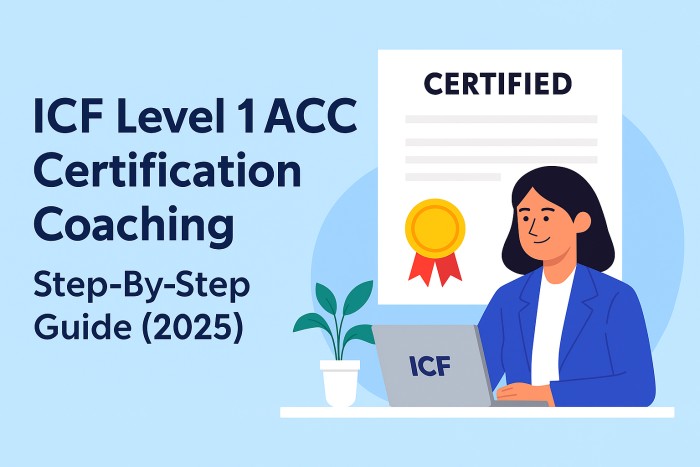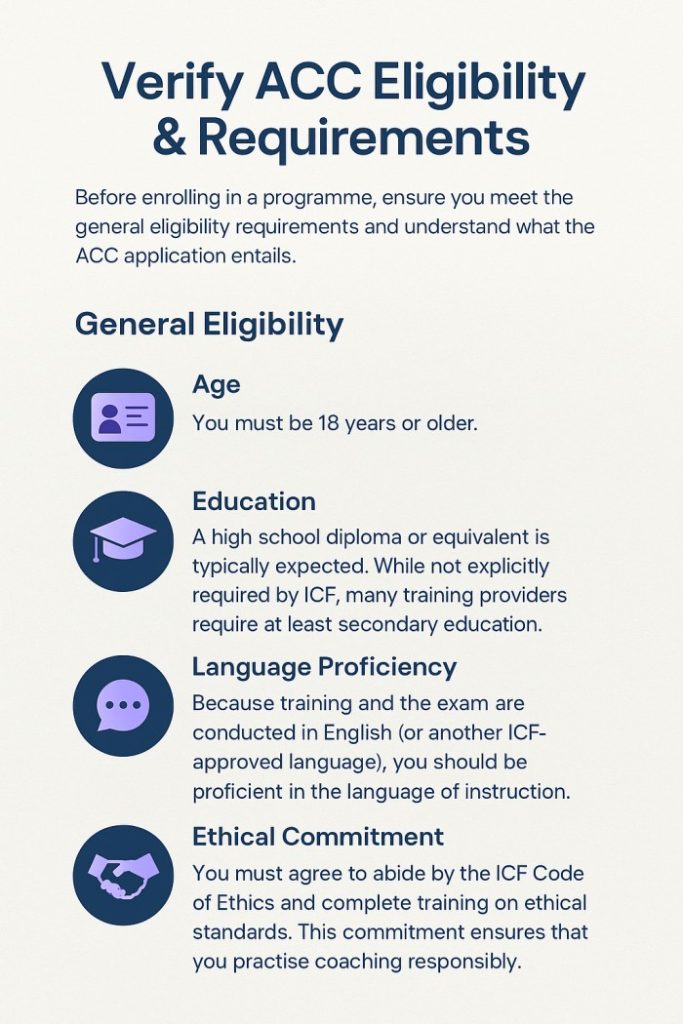
Effective strategic planning and stakeholder management are essential skills for leaders in a rapidly changing business environment. Strategic planning provides...
 Under the ICF’s credentialing framework, Level 1 programmes (previously known as ACSTH—Approved Coach Specific Training Hours) are designed to meet the educational requirements for the ACC credential. A Level 1 programme must include at least 60 hours of coach‑specific training, teach the ICF Core Competencies, and provide at least 10 hours of mentor coaching. After completing the program and fulfilling other requirements (coaching hours, mentor coaching, performance evaluation and exam), you can apply for the ACC credential.
Under the ICF’s credentialing framework, Level 1 programmes (previously known as ACSTH—Approved Coach Specific Training Hours) are designed to meet the educational requirements for the ACC credential. A Level 1 programme must include at least 60 hours of coach‑specific training, teach the ICF Core Competencies, and provide at least 10 hours of mentor coaching. After completing the program and fulfilling other requirements (coaching hours, mentor coaching, performance evaluation and exam), you can apply for the ACC credential.
| Path | Credential | Training Hours | Programme Requirements | Best For |
| Level 1 | ACC | 60+ hours | Coach‑specific training, mentor coaching, performance evaluation (optional), covers ICF Core Competencies | New coaches seeking entry‑level certification |
| Level 2 | ACC or PCC | 125+ hours | Comprehensive training, 10 hours of mentor coaching, required performance evaluation (for PCC), deeper practice and feedback | Coaches aiming for PCC or skipping ACC |
 Before enrolling in a programme, ensure you meet the general eligibility requirements and understand what the ACC application entails.
Before enrolling in a programme, ensure you meet the general eligibility requirements and understand what the ACC application entails.
| Requirement | Description |
| Training Hours | Complete a Level 1 (or Level 2) programme with at least 60+ hours of coach‑specific training. Training must cover ICF Core Competencies and include interactive components (live sessions, observed coaching). |
| Coaching Hours | Log 100 coaching hours with at least eight clients. At least 75 hours must be paid hours. |
| Mentor Coaching | Complete at least 10 hours of mentor coaching over at least three months with an ICF‑credentialed mentor (ACC +, but at least ACC with experience). |
| Performance Evaluation | Provide one or more audio recordings and transcripts of coaching sessions for evaluation (depending on the training provider; Level 1 providers may offer internal evaluations). |
| ICF Credentialing Exam | Pass the ICF exam, which tests knowledge of coaching ethics, competencies and application. |
| Application & Fees | Submit your application via the ICF portal, pay the required fee and await approval. |
| Programme Name | Delivery Method | Duration | Mentor Coaching | Approx. Cost (USD) |
| Programme A | Live online (weekends) | 3 months | Included (10 hours) | $3,200 |
| Programme B | Hybrid (in‑person + online) | 6 months | Offered separately | $3,800 + $600 mentor coaching |
| Programme C | Self‑paced with live practicum | 4 months | Included (group mentoring) | $2,500 |
For most coaches, the journey takes 9–18 months, depending on programme length, how quickly you accumulate coaching hours and the time required for mentor coaching and exam preparation. Some programmes accelerate the timeline, but the ICF requires mentor coaching to span at least three months.
Costs vary widely by programme and region. Expect to pay between $2,500 and $4,500 for Level 1 training, plus mentor coaching (if not included) and application/exam fees (around $300–$500). Membership in ICF offers discounted application fees.
Yes. Many Level 1 programmes encourage you to start coaching during training to accumulate required hours. However, be transparent about your student status and adhere to the ICF Code of Ethics. Some coaches charge reduced fees until they obtain their credential.
Membership is not mandatory, but it offers benefits including discounts on application fees, access to resources and a community of peers. Joining ICF can also demonstrate your commitment to professional standards.
If your application is incomplete or your documentation does not meet requirements, the ICF will request additional information. In rare cases where the application is denied, you may appeal or reapply after addressing deficiencies. Ensure you follow all instructions carefully and consult your mentor coach if needed.

Effective strategic planning and stakeholder management are essential skills for leaders in a rapidly changing business environment. Strategic planning provides...

Change Management & Digital Transformation: Build Adaptive Leaders with Erickson Coaching Rapid technological advances, shifting customer expectations and global disruption...

Discover how Erickson’s solution‑focused coaching delivers up to 788 % ROI and drives operational excellence by improving strategic thinking, communication and...

The coaching profession has moved from the margins to the mainstream. Recent global studies show that the number of professional...

India’s economy has transformed dramatically over the last decade, and the demand for top business coach India services has grown...

When searching for a certified life coach program price, it’s natural to start by comparing tuition fees. Aspiring coaches want...

Neuro-Linguistic Programming (NLP) is experiencing a resurgence in India. Social media, workshops and high-energy seminars promise instant breakthroughs by rewiring...

Many professionals pursue the title of Certified Organizational Development Coach with the expectation that a credential alone will open corporate...

Some providers offer to fast-track you to PCC status through purely online modules for a fraction of the cost of...